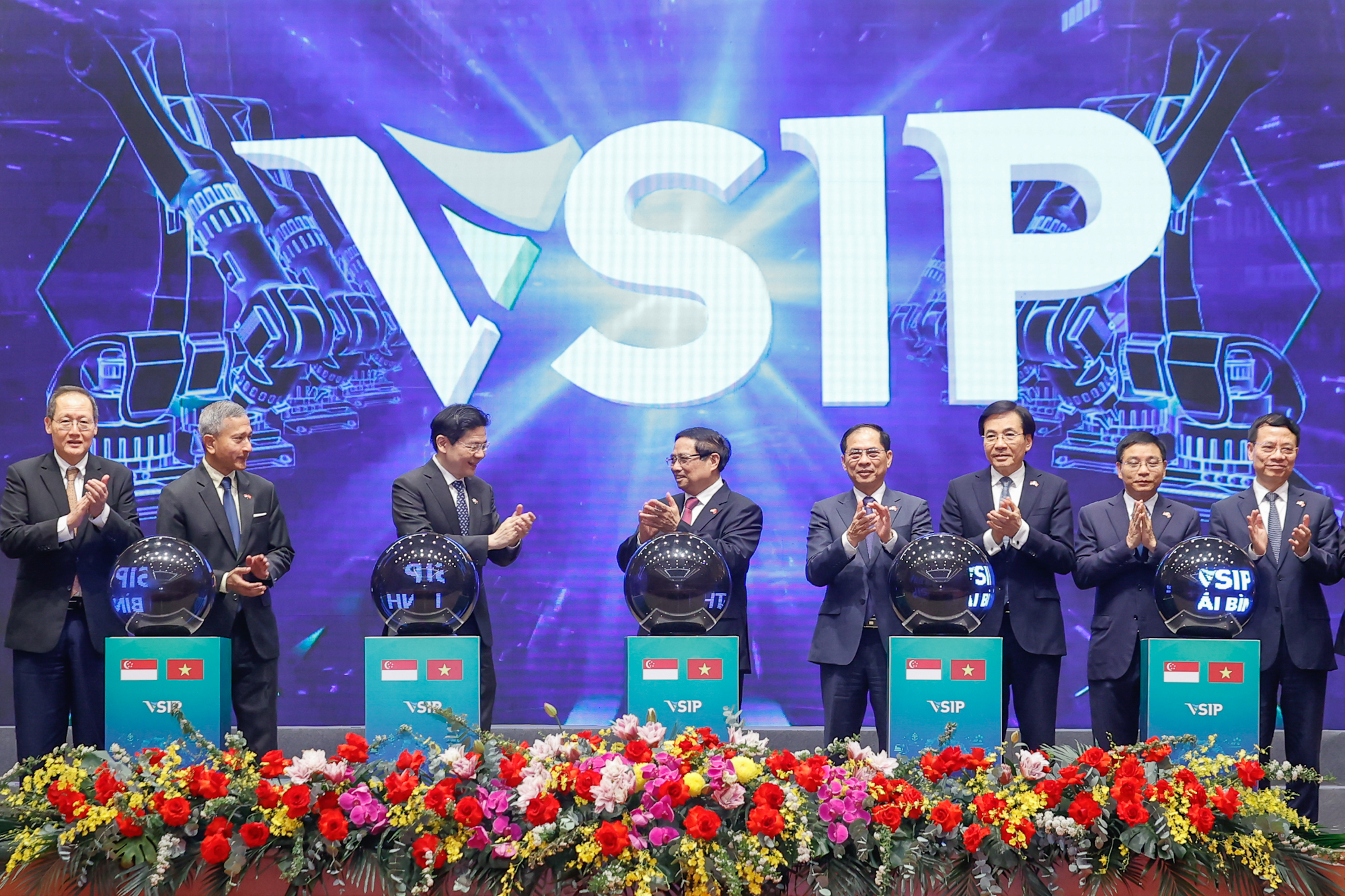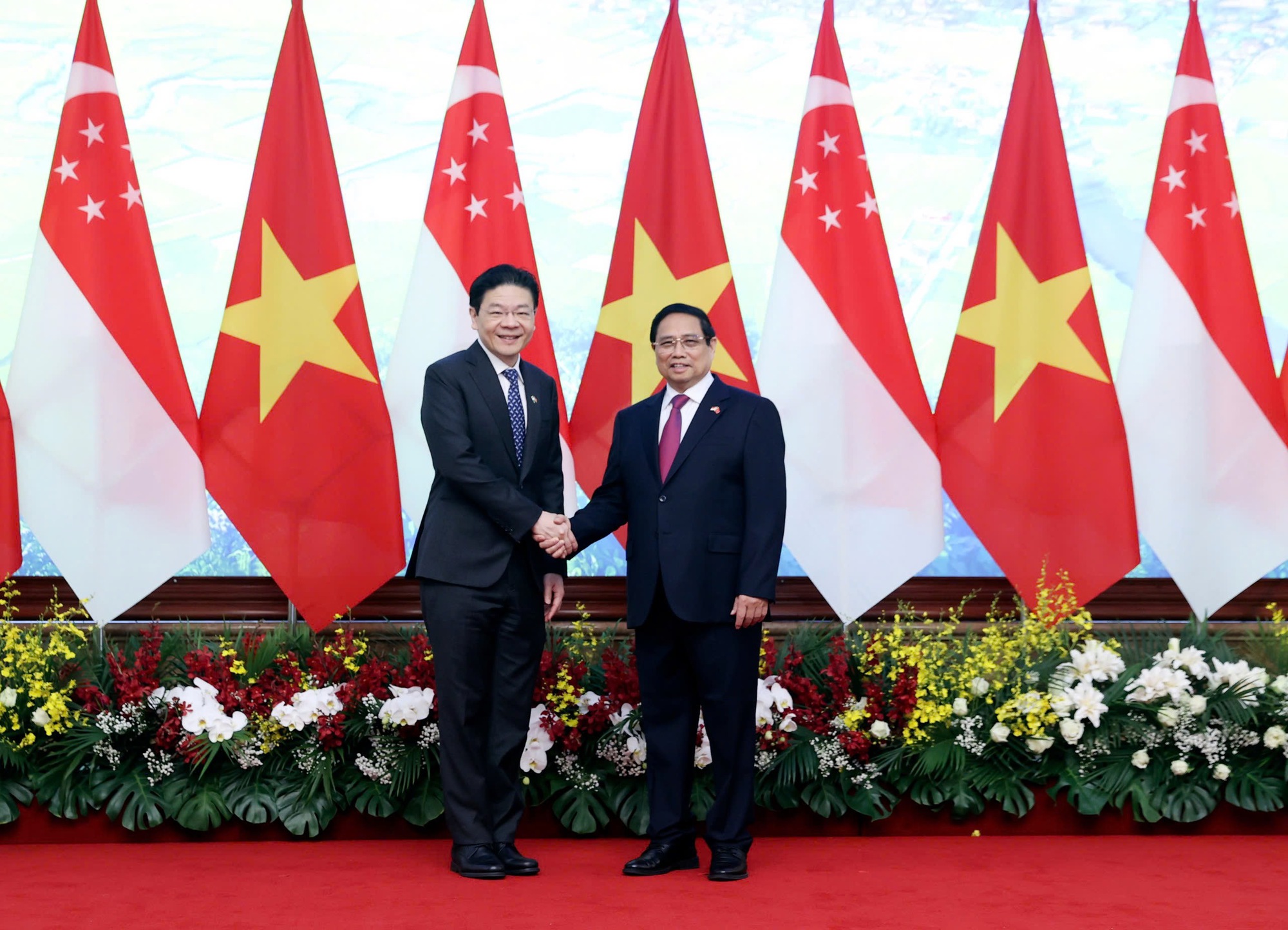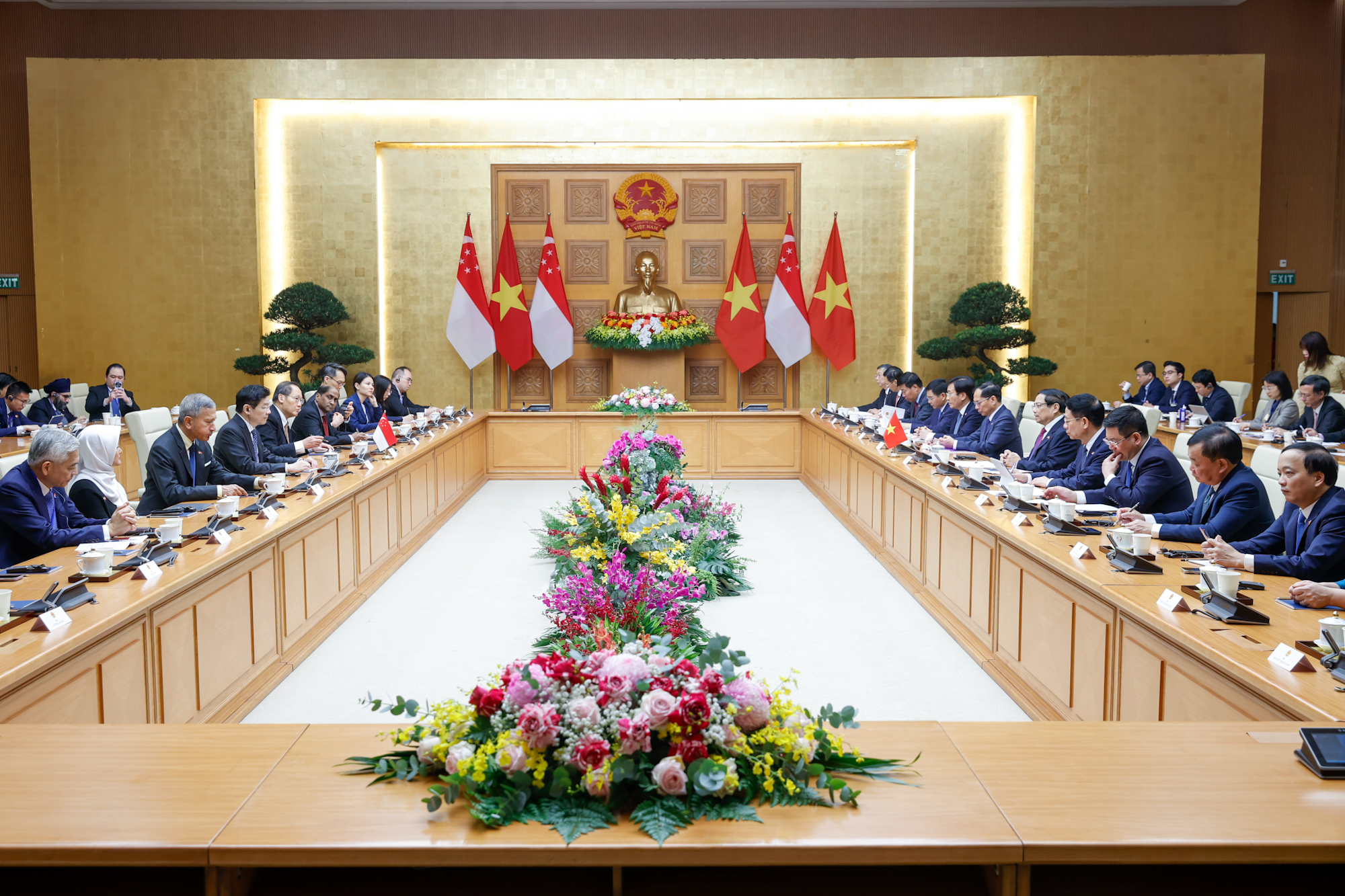Vietnam, Singapore target next-generation smart, sustainable industrial parks
Vietnam and Singapore hope to build green, smart, and AI-based industrial parks to foster mutual sustainable economic growth.
THE HANOI TIMES — Vietnam and Singapore expect the next generation of Vietnam-Singapore Industrial Parks (VSIP) to be more sustainable and smarter, in line with digital transformation, green transition, and environmental and social responsibility, Vietnamese Prime Minister Pham Minh Chinh said on March 26.

Prime Minister Pham Minh Chinh (fourth from left) and Singapore's Prime Minister Lawrence Wong (third from left) at the inauguration of the VSIP Thai Binh project. Photo: VGP
Speaking at the VSIP Thai Binh groundbreaking ceremony during his meeting with Singapore Prime Minister Lawrence Wong, Chinh praised the success of the first generation of VSIP projects.
The 333-ha VSIP Thai Binh has a total investment of over VND4.9 trillion (US$193 million).
The Vietnamese Prime Minister called them a symbol of the strong partnership between the two nations.
This model should capitalize on the complementary strengths of both economies, driven by innovation and the potential of their people and businesses, Chinh said.
For his part, Prime Minister Wong described VSIP as a "cornerstone" of bilateral cooperation over the past 30 years, highlighting that these industrial parks have consistently met high international standards, particularly in terms of infrastructure.
The VSIP reflects Singapore's confidence in Vietnam's economic potential and development. In addition, the successful economic, trade, and investment cooperation between the two countries has strengthened their relationship, he said.
The two countries' upgraded Comprehensive Strategic Partnership covers not only existing areas of cooperation, but also emerging fields such as innovation, digital economy, green economy, and high technology.
Both sides will explore different approaches to develop smarter VSIP projects that optimize costs, and improve efficiency while prioritizing renewable energy and environmental sustainability, he said.
As an example, he pointed to the Lego factory in VSIP Binh Duong, which is powered by solar energy. This is a successful model for green production and emission reduction in line with global trends.
Once connected to Lach Huyen Port in Haiphong by an expressway, VSIP Thai Binh will play a crucial role in supporting large factories in the region and attracting high-tech investment, PM Lawrence said.
Vietnam is one of the most successful adopters of Singapore's industrial park model, with 20 VSIPs serving as a symbol of long-term, effective and sustainable cooperation between the two governments and business communities.
With strong links to the global supply chain, VSIP Thai Binh is an ideal location for key industries such as electronic components, precision engineering, support industries and renewable energy.
Designed to meet high environmental standards, the park focuses on energy efficiency to develop a modern, eco-friendly industrial ecosystem, creating a sustainable and efficient manufacturing space.
Make Vietnam-Singapore partnership a regional model
During their talks, the two prime ministers agreed to deepen political trust and make new breakthroughs in their comprehensive strategic partnership.

Prime Minister Pham Minh Chinh (right) welcomes Singapore's Prime Minister Lawrence Wong during his visit to Vietnam. Photo: VGP
The two leaders pledged to finalize and effectively implement the 2025-2030 Action Plan under their new cooperation framework. They agreed to enhance high-level exchanges and optimize bilateral cooperation mechanisms, especially the annual meeting between the two prime ministers.
Vietnam and Singapore will further strengthen defense and security cooperation, especially in cybersecurity, based on mutual trust and understanding, contributing to regional and global peace, stability and development.
Both prime ministers pledged to deepen economic ties by leveraging the five pillars of the Vietnam-Singapore Economic Connectivity Agreement and the Green Economy-Digital Economy Partnership, making their partnership a regional reference.
The two governments aim to develop a smart and sustainable VSIP 2.0 network that integrates smart manufacturing technologies to attract high-quality investment to Vietnam.
Chinh and Wong also endorsed a "six better" approach to deepen political trust, enhance defense and security cooperation, strengthen economic connectivity, promote people-to-people ties, foster technological innovation, and strengthen regional and international cooperation.
The two sides agreed to advance cooperation in offshore wind power exports, carbon credit trading, and fintech, including cross-border QR code payments and data exchange.
They also pledged to strengthen cooperation in key areas such as education, workforce training, food security, cultural exchanges, tourism, air connectivity, and business networking.
On multilateral and regional cooperation, the prime ministers reaffirmed their commitment to maintaining the unity and centrality of ASEAN and promoting sustainable development in sub-regions such as the Mekong Delta.
Both prime ministers agreed to uphold ASEAN’s common stance on the East Sea (South China Sea), emphasizing the importance of freedom and safety of navigation and aviation.
They stressed the need for full and effective implementation of the Declaration on the Conduct of Parties in the South China Sea (DOC) and committed to work towards a substantive and effective Code of Conduct (COC) in accordance with international law, including the 1982 United Nations Convention on the Law of the Sea (UNCLOS)
In terms of investment, Singapore remains Vietnam's second largest investor.
Bilateral trade reached US$10.3 billion in 2024, while Vietnam has become the largest rice exporter to Singapore. The two countries' progress has been made in defense and security cooperation, education, science and technology, tourism, labor, and people-to-people exchanges.

The meeting of the two prime ministers. Photo: VGP
|
Cooperation documents signed At the meeting between the prime ministers, agencies and businesses from both countries inked several cooperation documents, including
|











